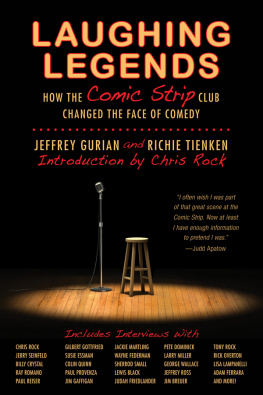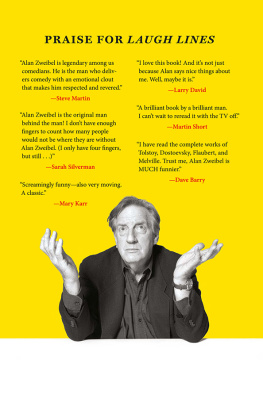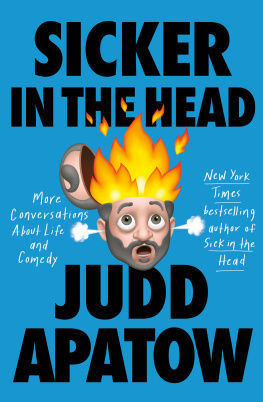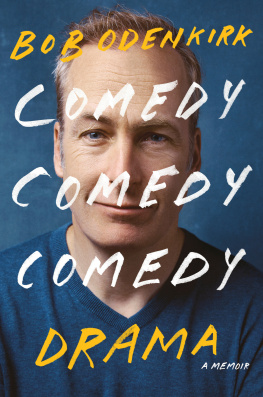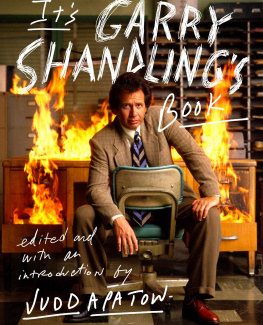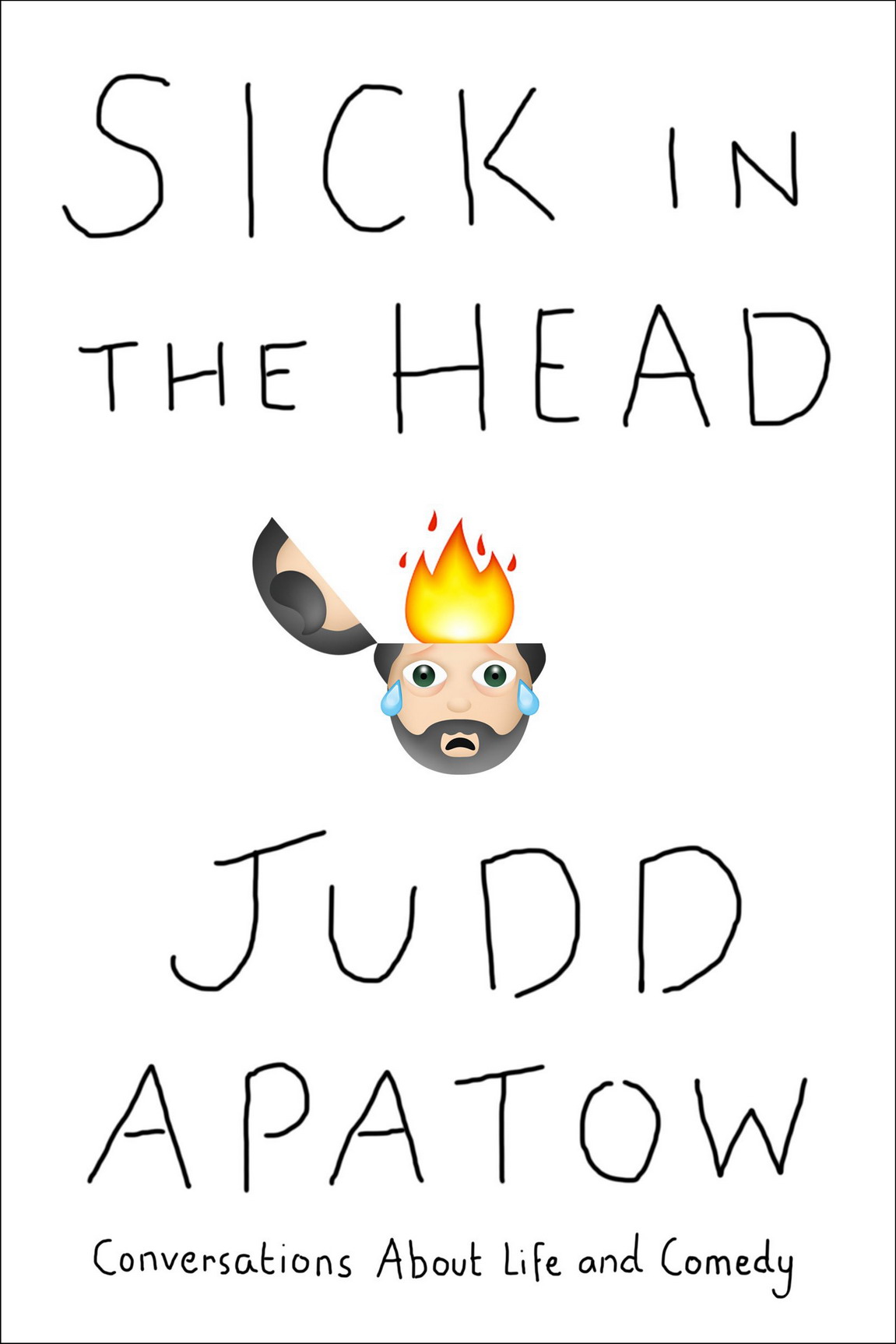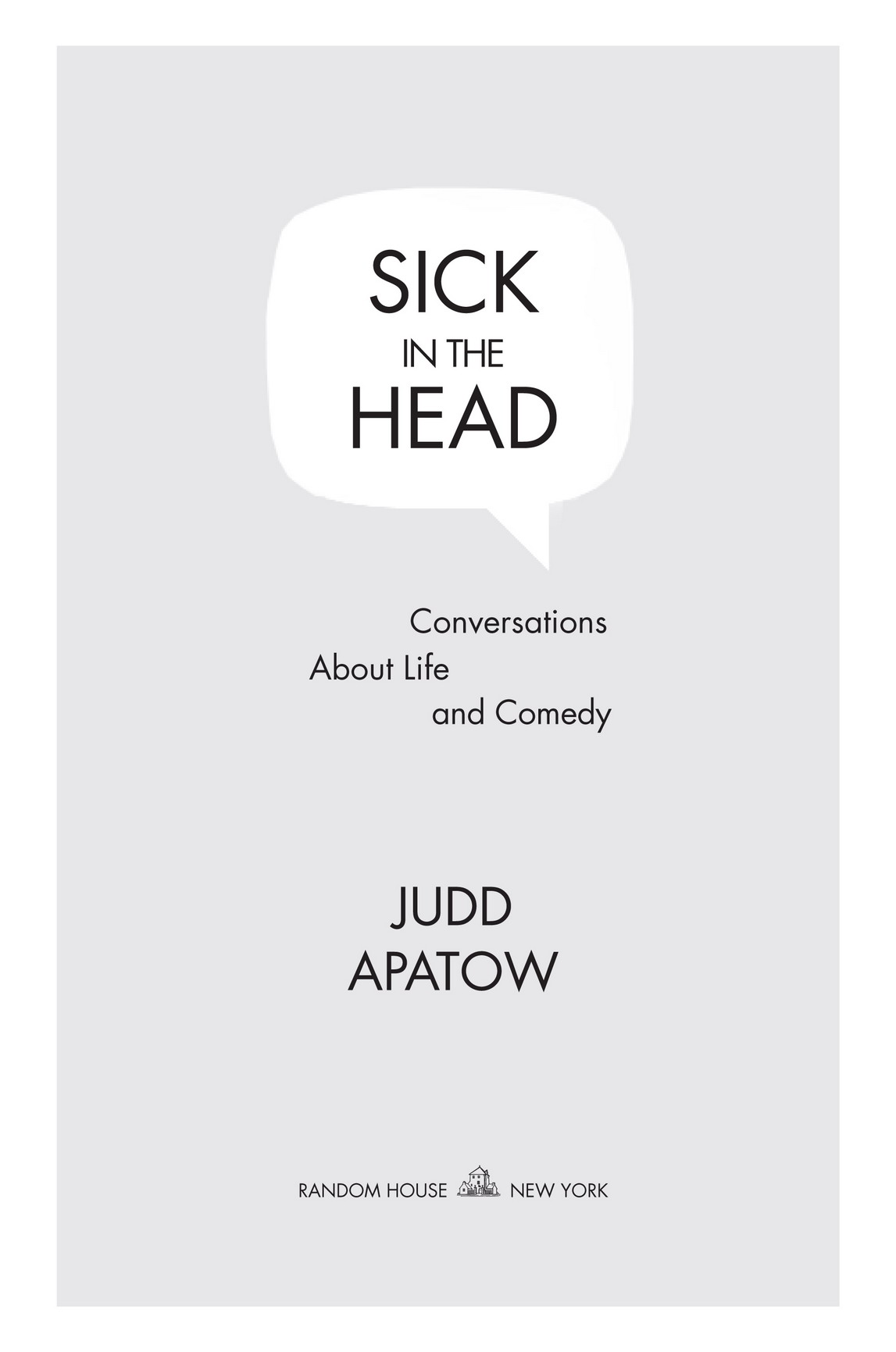Contents
The interviews in Sick in the Head have been condensed and edited for readability.
Copyright 2015 by Judd Apatow
All rights reserved.
Published in the United States by Random House, an imprint and division of Penguin Random House LLC, New York.
R ANDOM H OUSE and the H OUSE colophon are registered trademarks of Penguin Random House LLC.
Photographs not otherwise credited are used courtesy of the author.
Grateful acknowledgment is made to the following for permission to reprint the material specified below:
C OND N AST : Transcript from interview with David Denby, Judd Apatow, and Seth Rogan at The New Yorker Festival in 2009, 2009 The New Yorker/Cond Nast; Albert Brooks interview by Jim Windolf, Vanity Fair, January 2013, 2013 Cond Nast; Freaks and Geeks Oral History by Robert Lloyd, Vanity Fair, January 2013, 2013 Cond Nast. Reprinted by permission.
E MPIRE M AGAZINE : Mann and Husband by Olly Richards, from the March 2013 issue of Empire Magazine. Reprinted by permission.
E SQUIRE M AGAZINE : Apatow and Shandling by Mike Sager, from the October 2014 issue of Esquire Magazine. Reprinted by permission.
H UCK M AGAZINE : Judd Apatow vs. Miranda July, from the May 2013 issue of Huck Magazine. Reprinted by permission.
WTF WITH M ARC M ARON : Judd Apatow on WTF with Marc Maron podcast. Reprinted by permission.
M EADOWLANE E NTERPRISES : Judd Apatow interview with Steve Allen. Used by permission of Meadowlane Enterprises, Inc.
S ONY P ICTURES H OME E NTERTAINMENT : Transcript of The Cable Guy Blu-ray commentary with Ben Stiller and Jim Carrey. Courtesy of Sony Pictures Home Entertainment.
Library of Congress Cataloging-in-Publication Data
Apatow, Judd.
Sick in the head: conversations about life and comedy / Judd Apatow.
pages cm
ISBN 978-0-8129-9757-6
ebook ISBN 978-0-8129-9758-3
1. ComediansUnited StatesInterviews. 2. Stand-up comedyUnited States. 3. Television actors and actressesUnited StatesInterviews.
4. Motion picture actors and actressesUnited StatesInterviews. I. Title.
PN1969.C65A63 2015
792.760922dc23 2015008155
ebook ISBN9780812997583
www.atrandom.com
eBook design adapted from printed book design by Elizabeth A. D. Eno
Cover design and illustration: Rodrigo Corral and Zak Tebbal
v4.1_r4
a
CONTENTS
INTRODUCTION: WHY COMEDY?
How did I start interviewing comedians? Thats a good question. I was always a fan of comedy andokay, I have been completely obsessed with comedy for about as long as I can remember. I blame my dad. My dad was not a comedian, but he may have secretly longed to be one. When I was a kid, he would play us Bill Cosby records and even took me to see him perform at Hofstra University for my birthday when I was in fifth grade. (Note: In this introduction, I was going to talk at length about Bill Cosby, but I cant, in good conscience, because he has more sexual accusers than I have had partners.) From there I discovered Dickie Goodman, George Carlin, and Lenny Bruce, and then, when Steve Martin hit, I completely lost my mind. I bought every album he put outand couldnt stop doing an impression of him for the next five years. The biggest fight I ever got into with my parents was when we were at an Italian restaurant for dinner and I was trying to rush them out so we could get home in time to see Steve Martin on The Carol Burnett Show. They refused to hurry through their chicken parmesan and, as a result, I never got to see it. I remain furious.
The mid- to late seventies was a golden age in comedy. You had Richard Pryor, Saturday Night Live, Monty Python, SCTVall in their prime. The club scene was beginning to explode, too. In my room at night, I would circle the names of all the comedians in the TV Guide who were going to perform on talk shows that week so I wouldnt miss any. When I was in fifth grade, I produced a thirty-page report on the life and career of the Marx Brothers and paid my friend Brande Eigen thirty dollars to write it out for me, longhand, because he had better handwriting than I did. This, by the way, was not for school. I wrote it for my own personal use.
A comedy freak was born.
Im not sure why I was so drawn to comedy. Part of it, I think, was frustration. Looking back, I was an angry kid who didnt feel like the world made sense. My parents were not particularly spiritual people in those days, so they couldnt help much in the existential angst department. The closest they came to religion was saying over and over again throughout my childhood, Nobody said life was fair. It was the opposite of The Secret. It was The Anti-Secret. This left a bit of a void in my life, and I looked to comedyand the insights of comediansto fill it.
Plus, I was the youngest boy in my grade, so I was small. This size deficit led to me always being picked last in gym classevery day for thirteen years. When youre always picked last, you always get the worst position, like right field in baseball. Then, since you are always in the worst position, the ball never comes your way, so you never get a chance to show anyone that you are, in fact, good at this sport. But the truth is, you are not good at this sport because you are never involved in a play, because you are always in the worst position. When it is time to step up to bat, you feel so much pressure to do something incredible, like hit a home run, that you usually whiff. If you somehow manage to get a hit, your accomplishment is ignored by your peers, who chalk it up to luck. (No child in history has ever gone from last one picked to first one picked. That is a universal law that will never be broken.) Then the kid who is picked last never gets a girl to like him, because he has been labeled a loser.
Therefore, what else is there to do except decide that everyone else is the loser and you are the cool one?
That is how the cocky nerd comes to be.
So I had a lot of time to sit there, in right field, thinking about other things, like how unfair this whole setup was. If I wasnt handsome, how would I ever find a girl who would love me? Could someone who sucked at sports be popular? Was there a reason why nobody else was interested in the things I found interesting? Why did all the teachers think I was a pain in the ass and not someone special?
At that age, the comedians I liked most were the ones who called out the bullshit and gave voice to my angerthe Marx Brothers, Lenny Bruce, George Carlin, Jay Leno. I loved anyone who stood up onstage and said that the people in power were idiots, and not to be trusted. I was also drawn to people who deconstructed the smaller aspects of this bizarre and ridiculous life. I idolized the new generation of observational comedians like Jerry Seinfeld, Paul Reiser, and Robert Klein. I related to them and imitated them, and even began to write really bad jokes of my own in a notebook I hid in a small metal locker in my room. On Gilligans Island they went on a three-hour cruise, I wrote, so why did they bring so much luggage?


